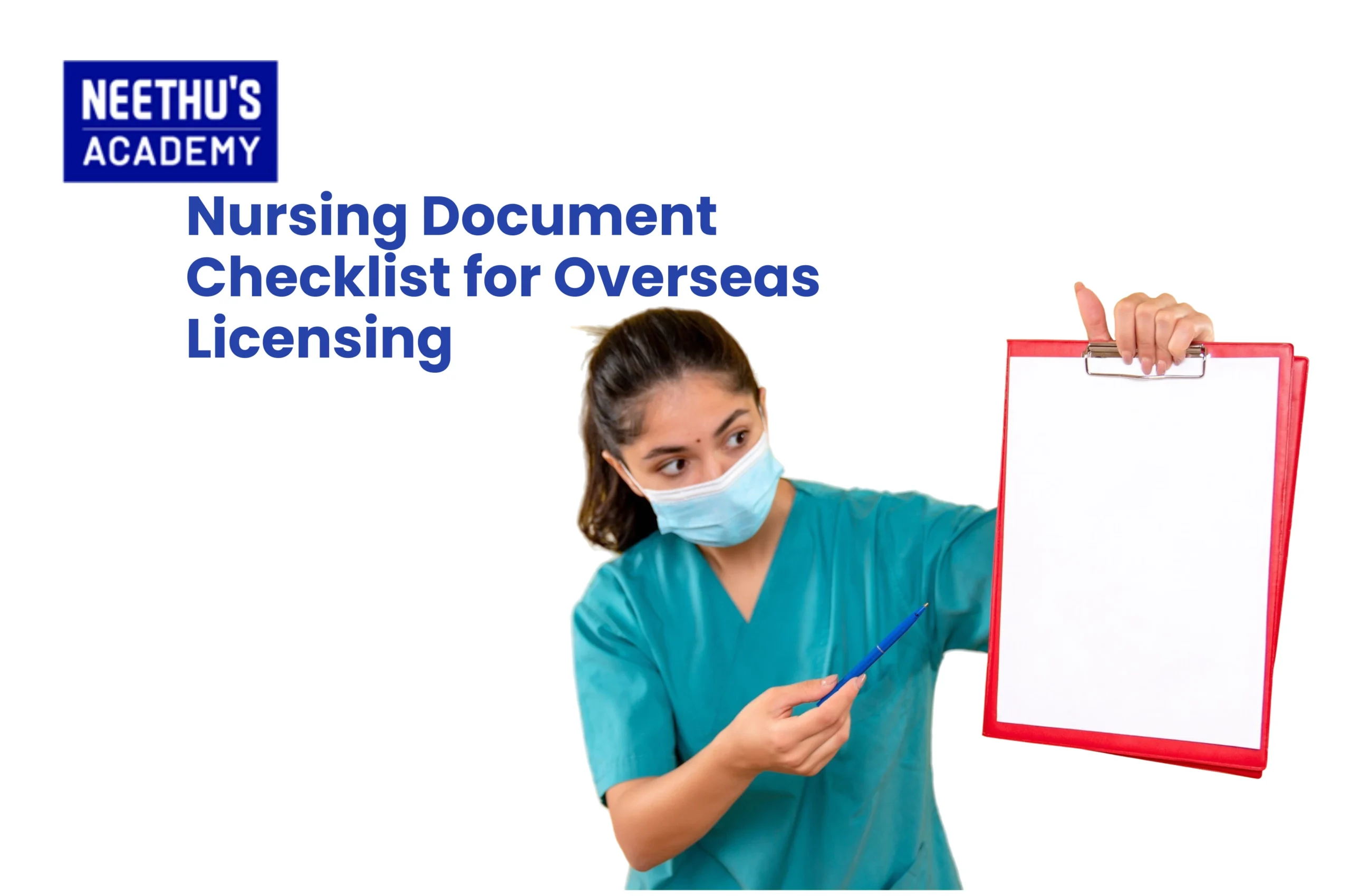Proving one's ability in the English language is a prerequisite for employment, education, or immigration to English-speaking countries in the globalized world.…

Nursing Document Checklist for Overseas Licensing
When you apply for nursing registration overseas, your documents are the pillar of your application. Every certificate, verification, and attestation you present is a confirmation of your qualification, reliability, and professional integrity. Without sufficient paperwork, even the most competent nurses can be delayed or rejected in their foreign licensing procedure. Hence, having a detailed nursing document checklist abroad makes your application go through easily and gets approved quickly.
No matter which country you’re targeting for nursing registration — the UK, Australia, Canada, New Zealand, or the Middle East — documentation requirements are stringent. This guide lists all the necessary nurse licensing documents and breaks down the process in detail — keeping you ahead of the competition in your global nursing career.
Basic Identity and Educational Certificates
To start with, you will need to collect your identity and qualifications documents. These are the basis of your nursing registration documents and are required for all foreign applications.
This is what you will generally need:
- Passport: A current passport is needed to verify your identity. Ensure it is not close to expiry when you apply.
- Birth Certificate: This proof shows your birthdate and location.
- Higher Secondary School Certificates and Secondary School Certificates: These verify your general education and are required by most issuing authorities.
- Nursing Diploma or Degree Certificate: The foundation of your application — it certifies your nursing education.
- Mark Sheets or Academic Transcripts: These give specific evidence of the subjects covered and your grades.
- Name Change Certificate (if applicable): If your present name is different from the name reflected in your educational records, attach an affidavit or a gazette notification.
It’s best to have these documents attested or notarized prior to submission. Always have both originals as well as a few certified copies in readiness.
Nursing Council Registration Documents
Your nursing council registration is the official proof that you’re a licensed nurse in your home country. Without this, no overseas authority can verify your legitimacy as a healthcare professional.
Essential documents in this category include:
- Registration Certificate from Nursing Council: Issued by your State Nursing Council or National Nursing Board.
- Good Standing Certificate (GSC): Establishes you don’t have any disciplinary problems and your license is current. It’s usually only good for 3–6 months, so get it as close to your submission date as possible.
- License Verification Form: Some foreign councils will get an answer directly from your home council. You may need to sign a form authorizing it in writing.
- Renewal or Re-registration Proof (if applicable): A few countries ask for proof your registration has been recently renewed.
Every destination country (such as NMC UK, AHPRA Australia, or NCNZ New Zealand) has a different verification format. Always access their website for the latest forms or procedures prior to submission.
Experience Certificates and Verifications
Experience is extremely important for overseas nurse licensure. Regulators desire to verify that you possess hands-on clinical experience and a professional background.
Documents to include:
- Experience Certificates: Issued by hospitals, clinics, or healthcare institutions where you’ve worked. These should be on official letterhead and signed by your nursing superintendent or HR manager.
- Employment Verification Letter: Confirms your employment duration, designation, and job responsibilities.
- Reference Letters: Optional but recommended. References from senior staff or department heads strengthen your application.
- Appointment Letters or Salary Slips (if necessary): Certain nations utilize these for documentation of employment genuineness.
Make sure your experience certificates carry your employment dates, department, and registration number. Take all letters in both physical and soft copies.
Medical Fitness and Police Clearance
Safety and public health are top concerns in global nursing practice. That is why all licensing authorities demand medical fitness and police clearance certificates.
Here's what you'll require:
- Police Clearance Certificate (PCC): From your local police station, Passport Office, or government agency. It attests that you do not have any criminal record.
- Medical Fitness Certificate: This must be authenticated by a qualified medical practitioner or hospital. It ensures that you are physically and mentally capable of working in healthcare.
- Vaccination and Immunization Records: Certain nations (such as the UK or Canada) might request immunization records like Hepatitis B, MMR, or COVID-19 vaccinations.
These records typically expire six months from issuance, so coordinate them with your licensing application accordingly.
Apostille and Embassy Attestation Steps
For your papers to be recognized overseas, they need to be authenticated using apostille or embassy attestation — the choice of which depends on the destination country’s laws.
Here's a step-by-step procedure:
- Notarization: Have your papers notarized by a professional notary public for verification of authenticity.
- State Attestation: The concerned State department (such as HRD or Home Department) authenticates your educational and personal documents.
- MEA Apostille: In case the country is a signatory to The Hague-Convention (such as UK or Australia), the Ministry of External Affairs (MEA) issues an apostille stamp.
- Embassy Attestation: For countries that are not signatories to The Hague-Convention (such as UAE, Qatar, or Saudi Arabia), attestation from the concerned embassy is needed.
- Final Verification: Certain employers or licensing authorities may also re-verify documents directly with the issuing authorities.
Attestation timings differ — typically 2 to 4 weeks — so plan ahead. Make use of dependable agencies or government-approved centres to process faster.
Conclusion
Organisation is the key to a hassle-free licensing process. Have a nursing document checklist for abroad ready at all times — with scanned copies saved securely in the cloud and paper formats.
An organised and properly maintained file assures that when the right moment comes, you can apply immediately without frantically looking for missing documents. It also enhances your professional reputation and accelerates approvals from nursing councils, recruitment firms, and overseas embassies.
Keep in mind that your documents serve as the link between your existing nursing career and global pursuits. Maintain them updated, verified, and readily available — your next chance might be a single submission away.
Frequently Asked Questions
Passport, nursing degree, registration certificate, good standing certificate, experience certificates, police clearance, and medical fitness report are required.
You may request verification directly from your State Nursing Council or mandate them to forward it to the overseas licensing authority.
Yes, nearly every nation requires a police clearance certificate for foreign health care candidates.
It’s possible in some nations, but most prefer or require evidence of recent clinical practice for approval of licensure.
Related Blogs
- All Posts
- IELTS
It is absolutely possible to increase your score in IELTS speaking within one month if you are motivated, really well prepared, and…
The reading module of the IELTS exam tests your comprehension skills on a variety of question types in a short period. Among…
Course Enquiry
Latest Posts
- All Posts
- canada
- CBT
- DELF
- DHA
- French
- GENERAL
- German
- Haad
- IELTS
- IQN NEW ZEALAND
- MOH
- NCLEX-RN
- NHRA
- OET
- OSCE
- Pearson Vue
- PROMETRIC
- PTE
- TOEFL
- Back
- NCLEX - NGN
- Back
- OET FOR PHYSIOTHERAPIST
- OET FOR PHARMACIST
- OET FOR DOCTORS



